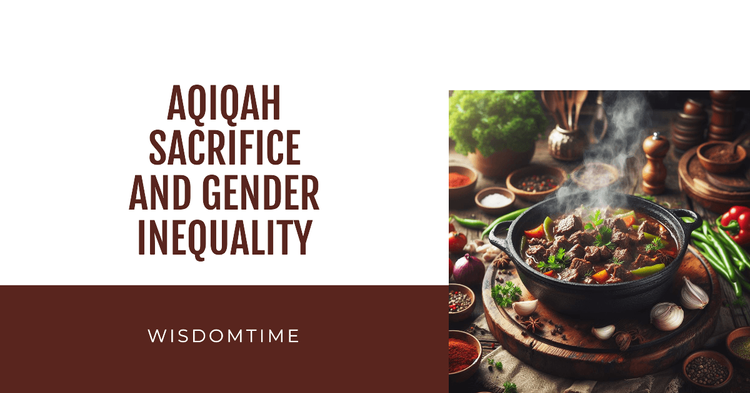
Akika Sacrifice and Gender Inequality
Question: Does the fact that one sacrifice is made for female children and two for male children in the case of the Aqiqah sacrifice indicate gender discrimination in Islam?
Answer: Before answering this question, let's remember two important principles:
1-)Judgment should not be based on a single hadith or verse. All relevant verses and hadiths on the subject should be considered before making a decision within that context.
2-)The interpretations of people, even if they are scholars, cannot be attributed to Islam, as they naturally provide their interpretations influenced by their cultures.
With this brief reminder, let's move on to our subject. When a child is born, a sacrifice called "Aqiqah" is performed as an expression of gratitude to Allah and as a protective charity against potential harm to the child.
Aqiqah is essentially an Arab tradition. Since it contains no sin and, on the contrary, carries the meaning of charity, Prophet Muhammad (peace be upon him) did not interfere with this tradition; in fact, he himself adhered to it. Essentially, it is an Arab tradition; Hanafi scholars do not see Aqiqah as a Sunnah but rather as a recommendation, as it a tradition where Prophet Muhammad (peace be upon him) did not intervene. Other sects, on the other hand, highlight the practice of the Prophet and argue that Aqiqah is a Sunnah.
In essence, Aqiqah is not something introduced by Islam, and especially not a specific act of worship. It is a beautiful tradition of the Arabs living at that time.
Although a hadith mentioning the Prophet's recommendation to sacrifice two animals for male children and one for female children is found in books like Ibn Majah and Abu Dawood, looking at different hadiths and the practices of the companions, we see that the situation is not as described in the question.
When examining historical records on this subject:
1-) In another hadith in Abu Dawood, it is narrated that the Prophet (peace be upon him) sacrificed one Aqiqah for both Hasan and Husayn.
2-) In Imam Malik's Muwatta, it is mentioned that knowledgeable and devout companions such as Ali and Abdullah ibn Umar sacrificed one Aqiqah for each of their sons and daughters.
So, looking at all the information on this topic, we cannot say that the situation is as described in the question.
On the other hand, as mentioned earlier, since this is originally an Arab tradition and they practiced it as it was widely accepted in their society, we cannot blame anyone. For example, suppose there is a custom in a region where it is the responsibility of the man to furnish the entire house in marriages. In this city, a person living there will spend more on his son's marriage than on his daughter's. Criticizing this as an ugly practice may not be meaningful.
Although they were Muslims at that time, some people who did not give up the habit of being more pleased with having a son than a daughter might have sacrificed two animals for having sons, and Prophet Muhammad (peace be upon him) might not have intervened in this matter. However, both he and the great companions who had adopted Islamic morality sacrificed one animal each without distinguishing between sons and daughters.
Since Aqiqah is essentially not a religious practice but an Arab tradition, it is rarely performed in Anatolia, where established practices of obligatory and wajib sacrifices exist. Distinction between wajib and fard, the latter being obligatory and the former slightly lesser degree than being obligatory.
References:
(1) Ibn Majah, 3163
(2) Abu Dawood, 2841
(3) Imam Malik, Muwatta, 26th Book, 4th Hadith
